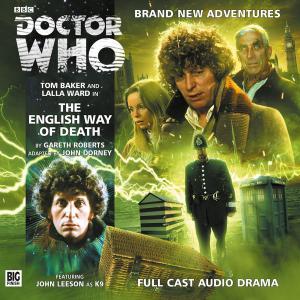14972
Written by Alan Barnes & Mike Maddox
Directed by Barnaby Edwards
Big Finish Productions, 2013 (re-released 2014)
“Watch closely, Doctor! In witnessing my end, the seeds of my beginning are sown in you. That is all it takes for you too to be made corrupt! Farewell, Doctor, I die in the knowledge that my circle is complete! ”
The Valeyard, Trial of the Valeyard
The season-long storyline of 1986’s The Trial of a Time Lord is considered by most devotees of classic Doctor Who to be a narrative muddle, thanks largely to tensions behind the scenes (between producer John Nathan-Turner and script editor Eric Saward) and the untimely death of a beloved writer and former script editor (Robert Holmes) who was originally commissioned to write the climax. Not only was it unclear which elements of the first 12 (of 14) episodes were true – with a large quantity of the evidence mounted against the Doctor being revealed as fabrication – but fans were bewildered by the fate of Peri Brown and the Sixth Doctor’s departure at the end of the saga with Melanie Bush, a companion that he hadn’t even met yet!
On top of that, there was the bombshell revelation that the enigmatic Valeyard, the prosecutor appointed by the High Council of the Time Lords to discredit the Doctor, was actually a future version of the Doctor himself – an “amalgamation of the darker side” of the Doctor’s nature, “somewhere” between his “12th and final incarnation”. It was a jaw-dropping moment in the life of the TV series that would truly not be equalled again until the unveiling of the War Doctor in the closing moments of The Name of the Doctor in 2013 (indeed, in the same episode, according to the Great Intelligence, one of the Doctor’s mythical aliases at Trenzalore included “Valeyard”). Just when we thought we all “knew” the Doctor, the Valeyard emerged from left field and left us absolutely staggered.
However, much like Peri Brown’s destiny and Mel’s “first” meeting with the Doctor, the Valeyard’s background and fate have remained sketchy for nearly three decades. The character was never seen again in the classic TV series and it has been left up to both unofficial and licensed spin-off fiction in that time to speculate on who or what the Valeyard is/was. Big Finish has, of course, satisfactorily wrapped up Peri and Mel’s story arcs from the Trial season but it is only recently that it has turned its attention back to resolving that season’s greatest riddle. Who or what was the Valeyard? What was his agenda, aside from seeking the Doctor’s remaining regenerations? What happened to the Valeyard after The Trial of a Time Lord, when it appeared he had deposed the Keeper of the Matrix and seemingly had all the secrets of the Matrix within his grasp? Indeed, given the Doctor in the modern TV series is now into his 14th incarnation, does the Valeyard even still exist? Could the Doctor still become the Valeyard if he ever gives into the darker side of his nature?
Sadly, Trial of the Valeyard doesn’t really answer any of these questions, certainly not in the way that The Widow’s Assassin wrapped up Peri’s story arc from the Trial season or The Wrong Doctors resolved the Mel paradox. Alan Barnes and Mike Maddox’s 60-minute script tantalisingly postulates about the Valeyard’s origins but leaves the listener to decide if there is any truth to the account or whether the antagonist is again resorting to the trickster role that he so deftly pulled off in his TV appearance.
Much like a Doctor Who Companion Chronicle, the serial successfully uses minimal characters with very few resources at its disposal while painting in the listener’s mind an expansive, galactic backdrop – a lavish courtroom aboard an oversized space station orbiting a gas giant designated as Eta Rho, the hints of a Time Lord Castellan and his squads of Chancellery Guards with their military TARDISes, and an obscure mudball planet hidden from plain sight which carries a dark secret. And all of this is carried by just three principal characters: the Doctor (the irrepressible Colin Baker), the Inquisitor and the Valeyard (effortlessly reprised by Lynda Bellingham and Michael Jayston).
If you are overly familiar with the courtroom setting of The Trial of a Time Lord (as well as some prior visits to Gallifrey in the classic series, including Arc of Infinity and The Five Doctors), then a good 90 per cent of your imagination is already well catered for. While some fans found many of the courtroom sequences in the original Trial lacklustre and tedious (especially in the opening 15 minutes of episode 13, when there was a lot of exposition), there is no doubt that this setting in Trial of the Valeyard is ideal for audio. The story feels as if it is happening in “real time”, as if you are one of the Time Lord jurors officiating over the proceedings and with a ringside seat to the squabbles, banter, pomp and ceremony of the three principal characters. Whatever the fans may have thought of the original courtroom sequences on TV, they were often convincing thanks to the earnest performances of Baker, Bellingham and Jayston – and this continues in Trial of the Valeyard. While the play may feel like an “episode 15” tacked onto the original TV serial, the three artists again carry the narrative in compelling fashion and still manage to pack the dialogue with moments of comedy, intrigue and malevolence.
Colin Baker, of course, continues to excel as the Sixth Doctor. In fact, the pre-credits track at the beginning of the story runs for over eight minutes – and nearly half of that time Baker is acting alone, as the Doctor petulantly rails against being brought back to the scene of his trial. Although there is a lot of wordy dialogue and some tongue-twisting vocabulary, he not only navigates through it skilfully but also injects a lot of humour into his performance as well. Indeed, Baker gets to demonstrate a range of emotions throughout the serial, from wit to sarcasm to outrage to revulsion, as the Doctor finds himself in the unenviable position of having to represent a defendant he loathes whilst also trying to ensure that the latter is treated as fairly as possible by the court. While the Sixth Doctor on television was often accused by fans of being heartless, Baker definitely shows the character’s compassion and innate sense of justice, especially when it becomes clear that the last thing the Time Lords have in mind is a fair trial.
Trial of the Valeyard is regrettably Lynda Bellingham’s Doctor Who swansong. She recorded this play only months before announcing a much publicised battle with cancer (she passed away last October). As a result, Bellingham’s performance in this serial is extra special because her Inquisitor once again plays an admirable mediator and paragon of patience to Baker’s Doctor and Jayston’s Valeyard. While the Inquisitor seemed “whiter than white” in the original Trial story arc, Bellingham relished the opportunity over the years to evolve the character into a more Machiavellian diva (the explicitly named Inquisitor Darkel) in Big Finish’s Gallifrey spin-off series. Barnes and Maddox do not ignore Gallifrey’s evolution of the character; not only is Bellingham’s Inquisitor and Darkel reinforced to be the one and the same in Trial of the Valeyard but there are strong hints that the Inquisitor isn’t as benevolent as she seems. As a result, Bellingham not only exudes authority as Darkel but at various times instils steel and underlying menace into her voice that makes you question her motives.
Michael Jayston naturally slides back into the robes of the Valeyard and again proves to be an excellent vocal foil for Baker’s Doctor. Like Baker, Jayston also has to contend with some very heavy dialogue, particularly in the second half of the play when the Valeyard’s origins are raised, and he passes the test with flying colours. While Jayston’s voice at times reveals his advanced years (he’s now 79), and will sound more weathered to listeners who (like this writer) grew up immersing themselves in the original Trial season, there is no doubt at all that we are listening to the persona “generally – but not exclusively – known as the Valeyard”. And while Bellingham has unfortunately bowed out long before her time, it is reassuring that Jayston has had another opportunity to reprise the Valeyard in The Last Adventure boxset that is slated for release in September.
Unsurprisingly, this play is, of course, steeped in Time Lord mythology, with much discussion about the secrets of regeneration (ironically Trial of the Valeyard was released in late 2013 when the modern TV series was poised to address the question of the Doctor’s survival post his 13th incarnation). However, what is even more interesting is the serial’s underlying theme of corruption. We are reminded that not only are characters like the Doctor and the Inquisitor capable of falling to the dark but also how deeply mired in the darkness the Time Lords themselves are. Whilst it came as a shock to many new series fans in David Tennant’s swansong The End of Time (2009-10) that the Time Lords in the Time War were as corrupt and villainous as the Daleks, fans well versed in the classic series had long known since 1976’s The Deadly Assassin (when the Doctor’s mentor Cardinal Borusa instigated a clever political cover-up) that the Time Lords were largely a corrupt society. Given Borusa later sought to become an immortal despot in The Five Doctors (1983) and that his successors on the High Council were later exposed for nearly destroying the planet “generally – but not exclusively – known as Ravalox” (aka Earth) in the original Trial, it comes as little surprise in this instalment that the Time Lords are again up to their high collars in corruption. Indeed, their tricks are so devious that the listener (much like the Doctor) has to concede that perhaps the defendant is a victim of their machinations and deserves the benefit of the doubt.
Trial of the Valeyard is a clever and engaging serial, and (even though it predates them by nearly 12 months) a marked improvement on the varied quality of recent Sixth Doctor audio adventures (eg The Widow’s Assassin, Masters of Earth, The Rani Elite). Much like the original Trial story arc, whose events hinted at truth amongst elaborate fabrication, so Barnes’ and Maddox’s script also drops enough hints about the Valeyard and the Time Lords to be plausible without being definitive. As a result, the antagonist doesn’t lose any of his mystique and listeners are left with even more questions about this enigma shrouded in paradox and in turn, about the virtue of the Time Lords.










